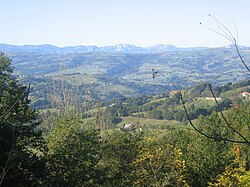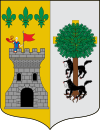Karrantza
| Karrantza | |||
|---|---|---|---|
| Municipality | |||

Valley of Karrantza
|
|||
|
|||
 Location of Karrantza within Biscay |
|||
| Country |
|
||
| Autonomous community |
|
||
| Province | Biscay | ||
| Comarca | Enkarterri | ||
| Government | |||
| • Mayor | Raúl Palacio (KZ) | ||
| Area | |||
| • Total | 137,66 km2 (5,315 sq mi) | ||
| Elevation | 155 m (509 ft) | ||
| Population (2011) | |||
| • Total | 2,794 | ||
| • Density | 0.20/km2 (0.53/sq mi) | ||
| Time zone | CET (UTC+1) | ||
| • Summer (DST) | CEST (UTC+2) | ||
| Postal code | 48891 | ||
| Website | Official website | ||
Karrantza (in Basque and officially, in Spanish Carranza), also known as Karrantza Harana (Basque for Valley of Karrantza) is a town and municipality located in the province of Biscay, in the Basque Country. It is located in the comarca of Enkarterri and it is the westernmost and largest (by area) municipality of the province.
Film director Víctor Erice was born there.
The first recorded appearance of the toponym of Karrantza is on the Chronicle of Alfonso III, dated in the 10th Century, where it appears as Carrantia. According to the text, Carrantia was one of the towns known to be populated during the reign of Alfonso I, King of Asturias. The origin of Carrantia comes from the Cantabrian dialect, meaning "high rocks". From Carrantia it would evolve to Carranza, the current Spanish toponym. Karrantza is the Basque toponym, an adaptation of Carranza following the Basque orthographic rules, and it is the official name of the municipality since 2001.
The first known vestiges of the human presence in the valley of Karrantza are some lithic tools, from the late Middle Paleolithic. In Karrantza is located the sanctuary of Venta Laperra, the oldest of the entire Basque Country, with several forms of Paleolithic art. There is evidence of ancient pastoral activity, as well as art forms belonging to hunter-gatherers from the Neolithic and the Bronze Age.
...
Wikipedia


